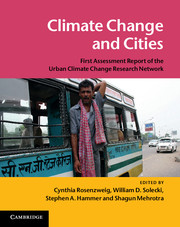Book contents
- Frontmatter
- Contents
- Foreword – Anna Tibaijuka
- Foreword – Rajendra Kumar Pachauri
- Foreword – Mayor Michael R. Bloomberg
- Foreword – Jeffrey D. Sachs
- Preface
- Executive Summary
- Part I Introduction
- Part II Defining the risk framework
- Part III Urban sectors
- Part IV Cross-cutting issues
- Conclusion: Moving forward
- Appendix A City case studies and topics in vulnerability, adaptation and mitigation
- Appendix B Acronyms and abbreviations
- Appendix C Steering Group, ARC3 authors, and reviewers
- Index
Foreword – Jeffrey D. Sachs
Published online by Cambridge University Press: 05 August 2012
- Frontmatter
- Contents
- Foreword – Anna Tibaijuka
- Foreword – Rajendra Kumar Pachauri
- Foreword – Mayor Michael R. Bloomberg
- Foreword – Jeffrey D. Sachs
- Preface
- Executive Summary
- Part I Introduction
- Part II Defining the risk framework
- Part III Urban sectors
- Part IV Cross-cutting issues
- Conclusion: Moving forward
- Appendix A City case studies and topics in vulnerability, adaptation and mitigation
- Appendix B Acronyms and abbreviations
- Appendix C Steering Group, ARC3 authors, and reviewers
- Index
Summary
The twenty-first century will be the age of sustainable development – or the age of ruin. Worldwide economic growth over the past two centuries has brought remarkable progress but also remarkable risk. By mobilizing fossil fuels, humanity lifted itself from the ancient scourges of hunger, disease, and early death. Living standards and income levels in many parts of the world soared beyond the wildest of expectations. Yet these gains are now bringing new and grave threats as well. Humanity has inadvertently pushed against the planet's safe boundaries regarding greenhouse gas emissions, land use changes, pollution, and human-induced threats to biodiversity and public health. In the coming decades, the core challenge of societies around the world will be to refashion our ways of life – living patterns, technologies, and economic systems – so that we can combine the benefits of economic development with sustainable management of the Earth's ecosystems.
Cities will be at the center of this unique and unprecedented challenge. During the past decade, humanity reached the decisive halfway point on the path to urbanization. From time immemorial until the Industrial Revolution two centuries ago, almost all of humanity lived as subsistence farmers in the rural areas. Starting two centuries ago, with the mobilization of new energy resources and technologies, including in food production, humanity began a long-term transition to urban living.
- Type
- Chapter
- Information
- Climate Change and CitiesFirst Assessment Report of the Urban Climate Change Research Network, pp. x - xiiPublisher: Cambridge University PressPrint publication year: 2011



